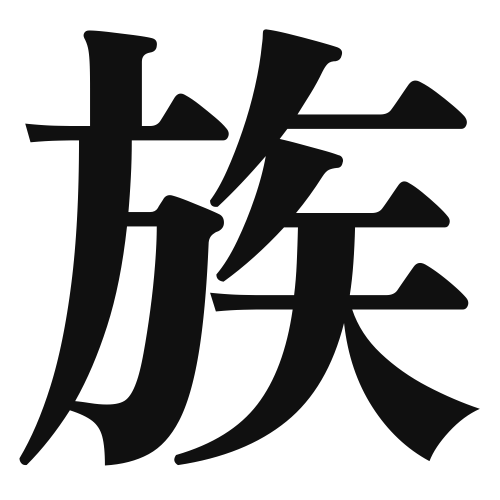1. Overview of Meaning
The kanji “族” (zoku) generally means “tribe,” “clan,” or “family.” It refers to a group of people who share a common ancestry or cultural background.
2. Formation and Radical
Formation of the Kanji: The kanji “族” is a compound character (会意文字) that combines elements to convey its meaning. It consists of the radical “毛” (meaning “hair” or “fur”) and the character “族,” which relates to groups or families.
Radical: The radical of “族” is “毛,” which often relates to things that are connected or associated with living beings.
3. Examples of Usage
Common Words and Phrases: Some frequently used words that include “族” are:
- 家族 (kazoku) – family
- 民族 (minzoku) – ethnic group
- 親族 (shinzoku) – relatives
Example Sentences in Daily Conversation:
- 私の家族はとても大切です。 (Watashi no kazoku wa totemo taisetsu desu.) – My family is very important to me.
- 彼は日本の民族について学んでいます。 (Kare wa Nihon no minzoku ni tsuite manandeimasu.) – He is studying about Japanese ethnic groups.
4. Synonyms and Antonyms
Similar Kanji: A similar kanji is “家” (ie), which means “house” or “home.” While “族” refers to a group of people, “家” focuses more on the physical dwelling or household.
Antonyms: An antonym could be “孤独” (kodoku), meaning “loneliness” or “solitude,” which emphasizes being alone rather than part of a group.
5. Cultural and Historical Background
Relation to Japanese Culture: The concept of “族” is deeply rooted in Japanese culture, where family and clan ties are highly valued. The importance of ancestry and heritage is reflected in various traditions and social structures.
Proverbs and Idioms: One common saying is “血は水よりも濃い” (Chi wa mizu yori mo koi), which translates to “Blood is thicker than water,” emphasizing the strength of family bonds over other relationships.
